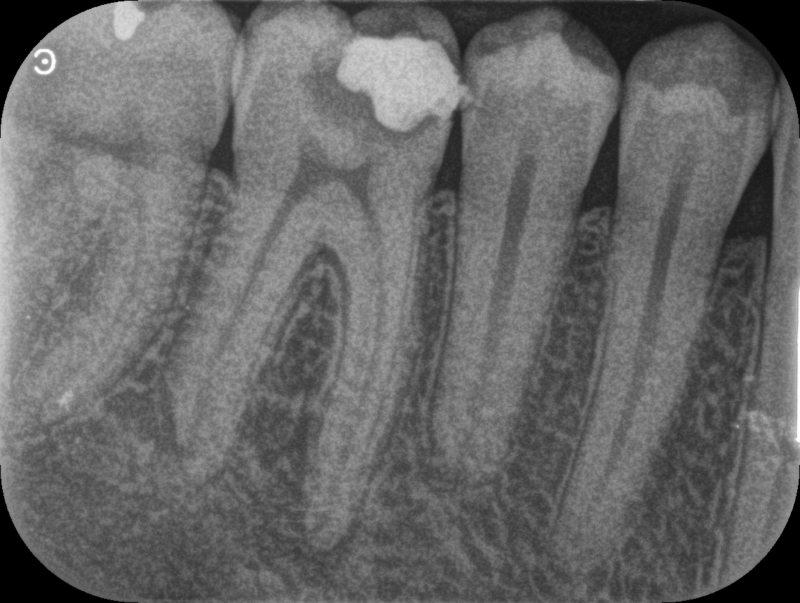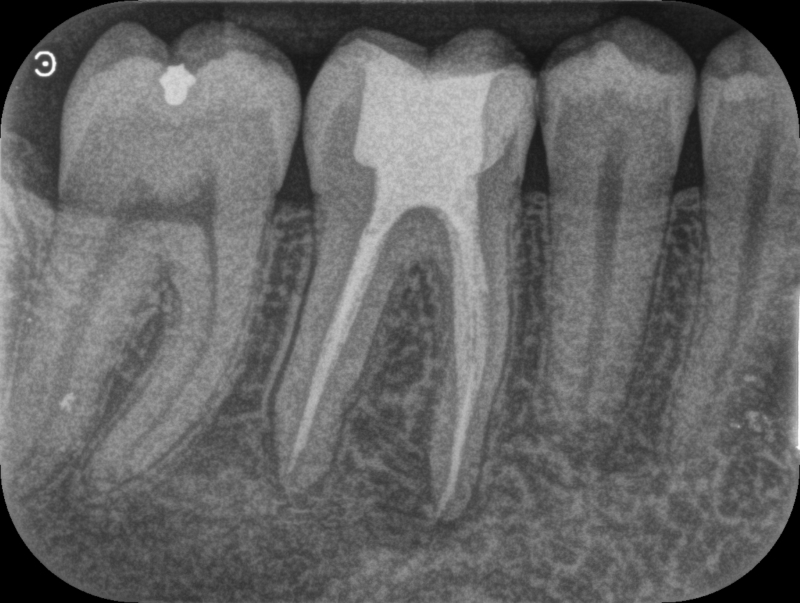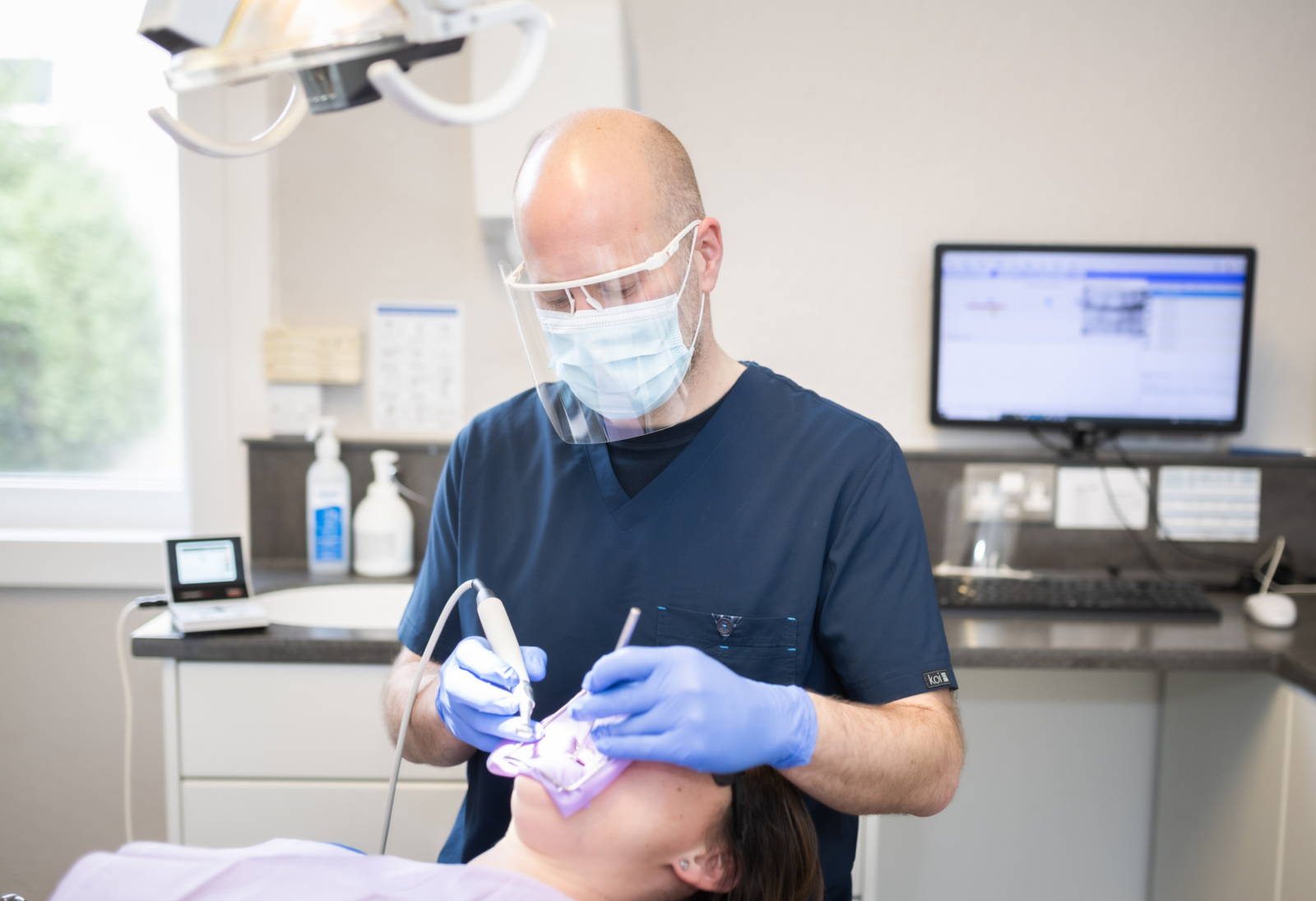What is a root canal?
If you’ve got an infection in a tooth, root canal treatment could be a solution, treating pain and helping to save your natural tooth, which may otherwise need to be extracted.
This treatment involves removing the soft centre of the tooth, known as the pulp. This is a collection of nerves, tissue and blood vessels which help your tooth to grow.
If infected, we can remove the pulp before thoroughly cleaning and filling or crowning the cavity. Removing injured or infected pulp is the best way to preserve the structure of your tooth long-term.
Why might you need a root canal?
A root canal could be an option in the treatment of:
- Deep cavities and decay.
- Chipped or fractured teeth.
- Dental injuries affecting the pulp.
Symptoms of pulp damage could include dental pain, swelling and a sensation of heat in your gums.
 Before treatment; decay in the first molar had caused a painful abscess.
Before treatment; decay in the first molar had caused a painful abscess.
 After treatment; pain free with the infection cleared and the root filled.
After treatment; pain free with the infection cleared and the root filled.
How is a root canal completed?
Your dentist will check through your medical history, examine your teeth and, if required, take x-rays to confirm the diagnosis and treatment options.
In particularly complex cases, you may need to be referred to a specialist – known as an endodontist – but many treatments can be completed routinely by your dentist.
If you choose to go ahead, on the day of your treatment anaesthetic will be used to make sure that you don’t experience any major discomfort during your root canal.
We tend to use local anaesthetic in our surgeries, but other dentists may also use intravenous drugs to sedate anxious patients.
When your tooth is numb, a small opening will be drilled into the top of the tooth, exposing the infected or damaged pulp. Files will be used to extract the pulp, carefully cleaning out the canals within your tooth.
The tooth will then be filled and sealed with a material called gutta-percha, before the top of the tooth is capped with a soft temporary seal. This helps to protect the tooth while it’s healing.
A few weeks later, you’ll need to pop back to the dentist so we can check up on your progress. All being well, the tooth will then be capped with a permanent filling, or a crown if that’s your preference.
Are there any risks?
There are potential risks with any surgical procedure, but the causes behind undertaking root canal treatment could be the reasons it fails.
Damage could be too deep, or the shell of the tooth too weak to withstand the procedure. If the treatment doesn’t effectively remove all trace of infection, further infection could occur.
The result could be additional treatment, or even a tooth extraction, but root canal treatment at least gives you a chance to save your natural tooth.
How much does root canal treatment cost?
For a single tooth, our root canal treatment costs are detailed below:
Incisor
Private patients from: £535
With Denplan Essentials from: £481.50
With Denplan Care: covered
Premolar
Private patients from: £588.50
With Denplan Essentials from: £529.65
With Denplan Care: covered
Molar
Private patients from: £642
With Denplan Essentials from: £577.80
With Denplan Care: covered
After having root canal treatment
Your dentist will provide information and answer any question you have, but you might also like to refer-back to the information below:
Keep the area clean – this will help to reduce inflammation around the tooth. Normal tooth brushing is advised, but perhaps leave it until a few hours after your treatment.
Take all medication as prescribed – this could include antibiotics to treat any lingering infection.
Avoid strenuous activity for at least 2 days – we don’t need much excuse to skip the gym but having root canal surgery is a pretty good reason.
Get a lift home – you could feel a little light-headed after having anaesthetic, so it’s a good idea for someone else to give you a lift home. If that’s not an option, you might like to take a bus, train, or taxi.
Choose softer foods – you might struggle with crunchy foods for a couple of days, so opt for soft things like pasta, rice, stew, yoghurt, or soups.
If you’ve got mild pain – you should be able to manage this at home using over-the-counter pain relief, such as paracetamol or ibuprofen.
If the pain won’t stop – seek medical attention as soon as possible. You can contact us, but out of hours you might need to go to A&E.
If your dressing falls out – don’t panic. Just call us and we’ll book you an appointment as soon as possible. In the meantime, you might need to avoid chewing on that side of your mouth and be extra careful when you brush.
We’ll do all we can to make sure there aren’t any complications, but if you find you’re not healing, continue to have pain, or have any other dental issues, please get in touch with us. We’re here to help.
After having restorative root canal treatment, most people enjoy positive results for the rest of their lives, as long as they maintain good oral hygiene.
Book for a more complete smile
Now you’ve had a chance to read about the treatments we can offer at White Gables Dental Practice, why not get in touch?
